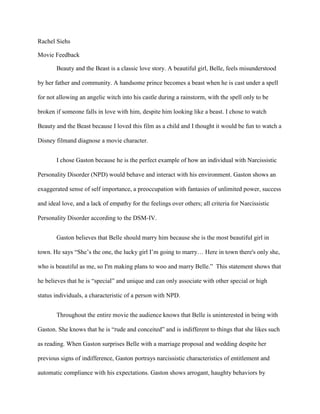
Gaston and Narcissistic personality disorder
- 1. Rachel Siehs Movie Feedback Beauty and the Beast is a classic love story. A beautiful girl, Belle, feels misunderstood by her father and community. A handsome prince becomes a beast when he is cast under a spell for not allowing an angelic witch into his castle during a rainstorm, with the spell only to be broken if someone falls in love with him, despite him looking like a beast. I chose to watch Beauty and the Beast because I loved this film as a child and I thought it would be fun to watch a Disney filmand diagnose a movie character. I chose Gaston because he is the perfect example of how an individual with Narcissistic Personality Disorder (NPD) would behave and interact with his environment. Gaston shows an exaggerated sense of self importance, a preoccupation with fantasies of unlimited power, success and ideal love, and a lack of empathy for the feelings over others; all criteria for Narcissistic Personality Disorder according to the DSM-IV. Gaston believes that Belle should marry him because she is the most beautiful girl in town. He says “She’s the one, the lucky girl I’m going to marry… Here in town there's only she, who is beautiful as me, so I'm making plans to woo and marry Belle.” This statement shows that he believes that he is “special” and unique and can only associate with other special or high status individuals, a characteristic of a person with NPD. Throughout the entire movie the audience knows that Belle is uninterested in being with Gaston. She knows that he is “rude and conceited” and is indifferent to things that she likes such as reading. When Gaston surprises Belle with a marriage proposal and wedding despite her previous signs of indifference, Gaston portrays narcissistic characteristics of entitlement and automatic compliance with his expectations. Gaston shows arrogant, haughty behaviors by
- 2. constantly looking at himself in the mirror (at Belle’s house and at the local tavern) and constantly is flexing and showing off his muscles to the town’s people (and himself). “No one says “no” to Gaston,” Gaston says after Belle rejects his marriage proposal. By saying this, Gaston shows an unwillingness to recognize the feelings of Belle or to understand that she is an independent person out of his control. Gaston then continues by singing a song abouthimself. In the song he expresses that he was always preoccupied with fantasies about having unlimited power and strength, proving that he has had a pervasive pattern of fantasies of possessing such. Gaston shows signs of excessive need for admiration of others by hanging out with LeFou his obese,ugly sidekick. In Gaston’s song, LeFou sings “Every guy here'd love to be you, Gaston, even when taking your lumps. There's no man in town as admired as you, you're everyone's favorite guy. Everyone's awed and inspired by you” proving LeFou’s admiration towards Gaston. Gaston not only requires excessive admiration which is fed by LeFou, but also interpersonally exploitative. He takes advantage of LeFou by leaving him out in the snow for days in order to be a look out for Belle or her father. By throwing Belle’s father into an insane asylum in order to woo Belle, Gaston shows a lack of empathy. Gaston believes that by locking up Belle’s father, she will want to marry him in order to save him. By taking advantage and exploiting Belle’s father, Gaston shows another characteristic of NPD: being interpersonally exploitative to achieve his own ends. Lastly, at the end of the movie Gaston is envious that Belle has fallen in love with the Beast. In order to regain a grandiose sense of self-importance, Gaston seeks admiration of the town’s people by gathering them all together in a mob-like fashion to kill the beast. Gaston’s
- 3. lack of empathy and envious intentions demonstrates that Gaston is only looking out for himself and desires people to view only him and not anyone else and will manipulate people to achieve his personal ends. Gaston is a perfect example of someone with Narcissistic Personality Disorder. He shows a pervasive pattern of grandiosity in fantasy and behavior, a high need for admiration and lacks empathy for others. He also shows arrogant, haughty behaviors and is interpersonally exploitative for self-gain, only. His sense of entitlement and excessive need for admiration is present through not only his behaviors and thoughts but with those he associates with.
- 4. Beauty and the Beast: An Analysis of the Narcissist, Gaston By Rachel Siehs